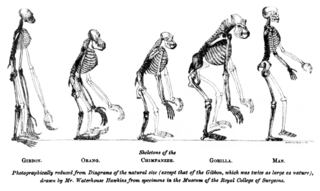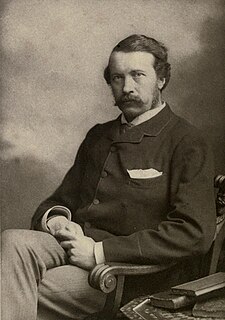
Darwinism is a theory of biological evolution developed by the English naturalist Charles Darwin (1809–1882) and others, stating that all species of organisms arise and develop through the natural selection of small, inherited variations that increase the individual's ability to compete, survive, and reproduce. Also called Darwinian theory, it originally included the broad concepts of transmutation of species or of evolution which gained general scientific acceptance after Darwin published On the Origin of Species in 1859, including concepts which predated Darwin's theories. It subsequently referred to the specific concepts of natural selection, the Weismann barrier, or the central dogma of molecular biology. Though the term usually refers strictly to biological evolution, creationists have appropriated it to refer to the origin of life, and it has even been applied to concepts of cosmic evolution, both of which have no connection to Darwin's work. It is therefore considered the belief and acceptance of Darwin's and of his predecessors' work—in place of other theories, including divine design and extraterrestrial origins.
Evolutionism describes the belief in the evolution of organisms. Its exact meaning has changed over time as the study of evolution has progressed. In the 19th century, it was used to describe the belief that organisms deliberately improved themselves through progressive inherited change (orthogenesis). The teleological belief went on to include cultural evolution and social evolution. In the 1970s the term Neo-Evolutionism was used to describe the idea "that human beings sought to preserve a familiar style of life unless change was forced on them by factors that were beyond their control".

Ontogeny is the origination and development of an organism, usually from the time of fertilization of the egg to the organism's mature form—although the term can be used to refer to the study of the entirety of an organism's lifespan.

In biology, phylogenetics is the study of the evolutionary history and relationships among individuals or groups of organisms. These relationships are discovered through phylogenetic inference methods that evaluate observed heritable traits, such as DNA sequences or morphology under a model of evolution of these traits. The result of these analyses is a phylogeny – a diagrammatic hypothesis about the history of the evolutionary relationships of a group of organisms. The tips of a phylogenetic tree can be living organisms or fossils, and represent the "end", or the present, in an evolutionary lineage. Phylogenetic analyses have become central to understanding biodiversity, evolution, ecology, and genomes.

Biological anthropology, also known as physical anthropology, is a scientific discipline concerned with the biological and behavioral aspects of human beings, their extinct hominin ancestors, and related non-human primates, particularly from an evolutionary perspective. It is a subfield of anthropology that provides a biological perspective to the systematic study of human beings.

Biological systematics is the study of the diversification of living forms, both past and present, and the relationships among living things through time. Relationships are visualized as evolutionary trees. Phylogenies have two components: branching order and branch length. Phylogenetic trees of species and higher taxa are used to study the evolution of traits and the distribution of organisms (biogeography). Systematics, in other words, is used to understand the evolutionary history of life on Earth.

Sociobiology is a field of biology that aims to examine and explain social behavior in terms of evolution. It draws from disciplines including ethology, anthropology, evolution, zoology, archaeology, and population genetics. Within the study of human societies, sociobiology is closely allied to Darwinian anthropology, human behavioral ecology and evolutionary psychology.

In biology, taxonomy is the science of defining and naming groups of biological organisms on the basis of shared characteristics. Organisms are grouped together into taxa and these groups are given a taxonomic rank; groups of a given rank can be aggregated to form a super-group of higher rank, thus creating a taxonomic hierarchy. The principal ranks in modern use are domain, kingdom, phylum, class, order, family, genus, and species. The Swedish botanist Carl Linnaeus is regarded as the father of taxonomy, as he developed a system known as Linnaean taxonomy for categorizing organisms and binomial nomenclature for naming organisms.
Zoology is the branch of biology that studies the animal kingdom, including the structure, embryology, evolution, classification, habits, and distribution of all animals, both living and extinct, and how they interact with their ecosystems. The term is derived from Ancient Greek ζῷον, zōion, i.e. "animal" and λόγος, logos, i.e. "knowledge, study".

Neo-Darwinism is the interpretation of Darwinian evolution through natural selection as it has variously been modified since it was first proposed. It was early on used to name Charles Darwin's ideas of natural selection separated from his hypothesis of pangenesis as a Lamarckian source of variation involving blending inheritance.

This is a list of topics in evolutionary biology.

In biology, adaptation has three related meanings. Firstly, it is the dynamic evolutionary process that fits organisms to their environment, enhancing their evolutionary fitness. Secondly, it is a state reached by the population during that process. Thirdly, it is a phenotypic or adaptive trait, with a functional role in each individual organism, that is maintained and has evolved through natural selection.

Orthogenesis, also known as orthogenetic evolution, progressive evolution, evolutionary progress, or progressionism, is the biological hypothesis that organisms have an innate tendency to evolve in a definite direction towards some goal (teleology) due to some internal mechanism or "driving force". According to the theory, the largest-scale trends in evolution have an absolute goal such as increasing biological complexity. Prominent historical figures who have championed some form of evolutionary progress include Jean-Baptiste Lamarck, Pierre Teilhard de Chardin, and Henri Bergson.
A sister group or sister taxon is a phylogenetic term denoting the closest relatives of another given unit in an evolutionary tree. The expression is most easily illustrated by a cladogram:

Paleobiology is a growing and comparatively new discipline which combines the methods and findings of the life science biology with the methods and findings of the earth science paleontology. It is occasionally referred to as "geobiology".
Biology is the natural science that studies life and living organisms, including their physical structure, chemical processes, molecular interactions, physiological mechanisms, development and evolution. Despite the complexity of the science, there are certain unifying concepts that consolidate it into a single, coherent field. Biology recognizes the cell as the basic unit of life, genes as the basic unit of heredity, and evolution as the engine that propels the creation and extinction of species. Living organisms are open systems that survive by transforming energy and decreasing their local entropy to maintain a stable and vital condition defined as homeostasis.
In biology, biological specificity is the tendency of a characteristic such as a behavior or a biochemical variation to occur in a particular species.

Teleology in biology is the use of the language of goal-directedness in accounts of evolutionary adaptation, which some biologists and philosophers of science find problematic. The term teleonomy has also been proposed. Before Darwin, organisms were seen as existing because God had designed and created them; their features such as eyes were taken by natural theology to have been made to enable them to carry out their functions, such as seeing. Evolutionary biologists often use similar teleological formulations that invoke purpose, but these imply natural selection rather than actual goals, whether conscious or not. Dissenting biologists and religious thinkers held that evolution itself was somehow goal-directed (orthogenesis), and in vitalist versions, driven by a purposeful life force. Since such views are now discredited, with evolution working by natural selection acting on inherited variation, the use of teleology in biology has attracted criticism, and attempts have been made to teach students to avoid teleological language.
Modern synthesis or modern evolutionary synthesis refers to several perspectives on evolutionary biology, namely:








